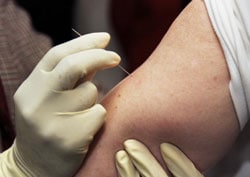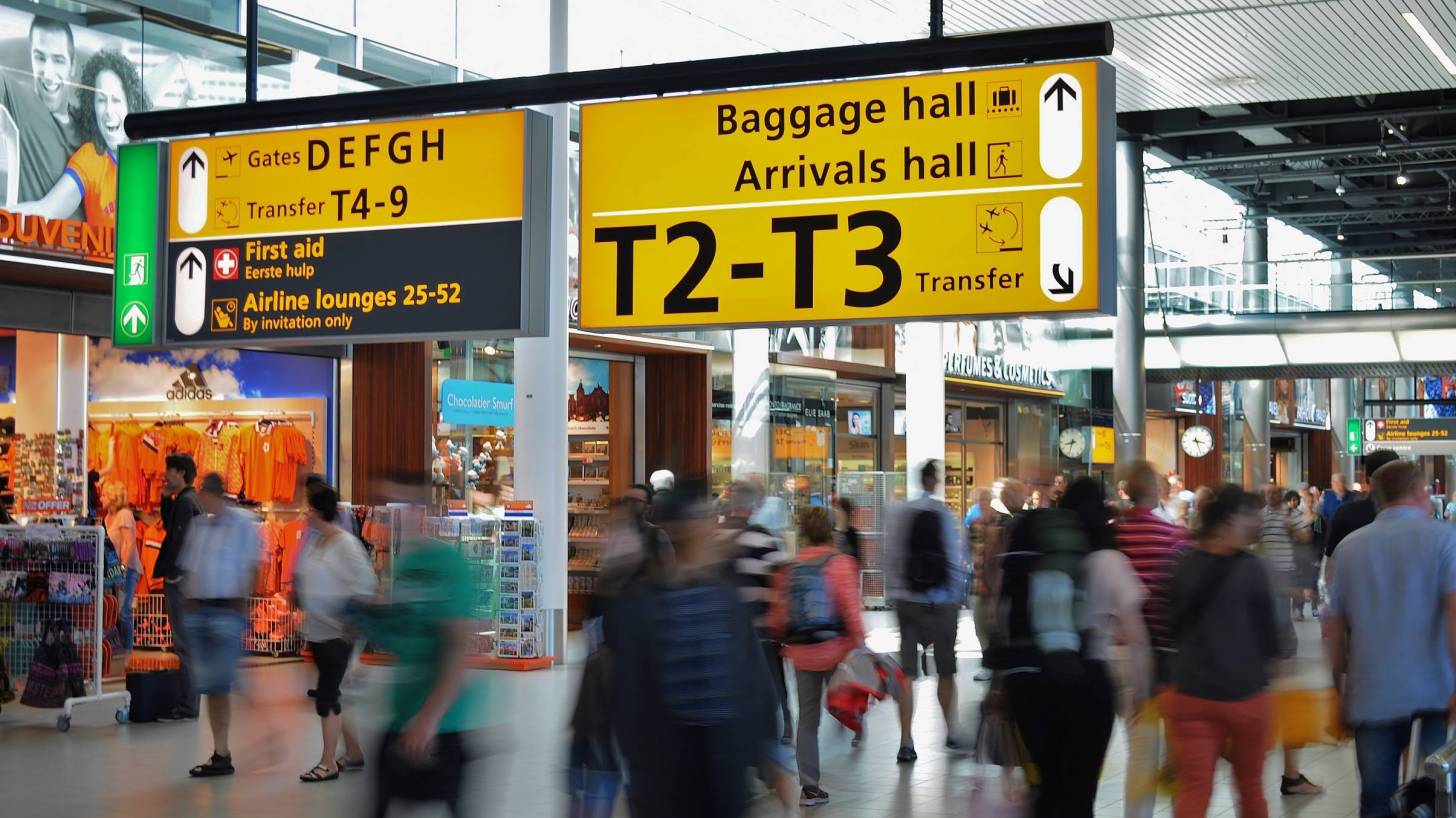Helen Branswell also addressed the outbreaks today:
U.S. monkeypox case reported, as Spain, Portugal report infections in growing outbreak
By Helen Branswell May 18, 2022
Reprints
This highly magnified electron micrographic images shows a mulberry-type monkeypox virus particle. CDC
The United States confirmed a case of monkeypox infection on Wednesday in a man who recently traveled to Canada. It is not yet clear if the man, who lives in Massachusetts and who traveled to Canada by car, is connected to the growing outbreak of monkeypox cases in Europe.
The case was announced in a
statement posted to the website of the Massachusetts Department of Public Health. Confirmatory testing was done by the Centers for Disease Control and Prevention, which had warned earlier Wednesday that cases in this country were likely to begin to be detected.
“Given that we have seen now confirmed cases out of Portugal, suspected cases out of Spain, we’re seeing this expansion of confirmed and suspect cases globally, we have a sense that no one has their arms around this to know how large and expansive it might be. And given how much travel there is between the United States and Europe, I am very confident we’re going to see cases in the United States,” said Jennifer McQuiston, deputy director of the CDC’s division of high consequence pathogens and pathology.
McQuiston said in an email Wednesday that it has not yet been determined if the Massachusetts case was part of the growing European outbreak.
The development adds the United States and possibly Canada to a growing list of countries reporting monkeypox cases in an
outbreak first spotted in the United Kingdom. The Public Health Agency of Canada said in a statement late Wednesday that no cases have been reported at this time.
Maria Van Kerkhove, who leads the emerging diseases and zoonoses unit in the World Health Organization’s Health Emergencies Program, said Spain has now confirmed some cases and other countries will join this list.
“We have had positive cases identified in the U.K., Portugal, and Spain. And we expect there will be others,” Van Kerkhove told STAT on Wednesday.
Related:
CDC expresses concern about possibility of undetected monkeypox spread in U.K.
Earlier in the day Spain announced that it was investigating eight suspected cases, and Portugal said it was investigating more than
20 suspected cases, five of which have already been confirmed. It is not currently clear if the outbreaks are linked to each other or to the one in the U.K., where nine confirmed and one probable case have been reported.
If they are connected, it is not yet known if the virus spread from the U.K. to Europe, or the reverse. Nor is it known how long the virus has been spreading in these countries. “Clearly it’s been going on for a few weeks,” said Van Kerkhove.
Most of the cases have been detected in men who are gay, bisexual, or are men who have sex with men, she confirmed, but cautioned against over-focusing on that fact.
“We’re finding where we’re looking,” Van Kerkhove said, noting that countries have been contacting sexual health clinics asking about patients with unusual rashes. It is important that other health care providers in other settings — general practitioners, dermatologists, and others — are aware of the possibility they might see monkeypox cases so that if the virus is spreading more broadly, they take adequate precautions and those cases aren’t missed.
The details that have come to light so far raise the prospect of an outbreak that is even more geographically widespread, said Michael Osterholm, director of the University of Minnesota’s Center for Infectious Disease Research and Policy.
“There could be dynamic transmission here that we just haven’t appreciated because of the potential number of contacts,” he said, adding it will be important to collect information about how much intimate contact patients have had and where those contacts may have come from.
Tom Inglesby, director of the Center for Health Security at the Johns Hopkins Bloomberg School of Public Health, said a number of countries outside Central and West Africa, where monkeypox is more common, have experience coping with introductions of the virus, so there is a possibility that the outbreaks will be “relatively small.”
“I think that’s still probable, given the past,” Inglesby told STAT. “But on the other hand, this is starting off with much more of a foothold, in a much more distributed way, and we don’t understand how it got … into those networks.”
Newsletters Sign up for Daily Recap
A roundup of STAT's top stories of the day.
Privacy Policy
“This could have the potential to move around and is going to require pretty strong public education efforts in affected communities and maybe even more broadly, so that people recognize the possibility” of monkeypox infection, he said.
The U.K. Health Security Agency
announced Wednesday that it had detected two additional cases, bringing to nine the number reported there this month. Prior to this outbreak the U.K. had only ever detected seven monkeypox cases. The two latest cases had not traveled to the countries where monkeypox virus is endemic, and have no known links to any of the prior cases
“so it is possible they acquired the infection through community transmission,” the agency said in a statement, adding that recent cases have been predominantly among men who identify as gay, bisexual, or who have sex with men.
The rapid accumulation of cases is ringing alarm bells.
On Tuesday, the CDC
signaled it was worried about the state of the outbreak in the U.K. and the potential that cases would be found in other countries.
“We do have a level of concern that this is very different than what we typically think of from monkeypox,” McQuiston said. “We don’t understand how many other cases could be out there in the U.K., for example, with undefined chains of transmission.
We have a sense that there might be some unusual methods of transmission, through intimate contact or some form of close personal contact that we’ve not previously associated with monkeypox.”
The WHO, which previously designated monkeypox as a priority pathogen, has organized a meeting of experts on monkeypox and orthopoxviruses — the wider family of pox viruses — for early next week. Among the issues the experts will likely tackle is an apparent change in the epidemiology of the disease in countries where the virus is endemic that has occurred in recent years.
“We’re seeing a shift in the age distribution of cases. We’re seeing a shift in the geographic distribution of cases,” said Michael Ryan, executive director of the WHO’s Health Emergencies Program. “We have to really understand that deep ecology. We have to really understand human behavior in those regions and we have to try to prevent the disease from reaching humans in the first place.”
The monkeypox virus is related to the variola virus, which caused smallpox, a once dreaded disease that was declared eradicated in 1980. The symptoms of monkeypox are similar to but milder than smallpox.
Infected people develop flu-like symptoms — fever, body aches, chills — but also swollen lymph nodes. With one to three days of the onset of fever, a distinctive rash appears, often starting on the face. Many conditions can cause rashes but the monkeypox rash has some unusual features, notably the fact that vesicles can form on the palms of the hands.
In countries where it is endemic, the virus is believed to mainly spread to people from infected animals when people kill or prepare bushmeat for consumption.
Once the virus jumps to people, human-to-human transmission can occur via respiratory droplets — virus-laced saliva that can infect the mucosal membranes of the eyes, nose, and throat — or by contact with monkeypox lesions or bodily fluids, with the virus entering through small cuts in the skin. It can also be transmitted by contact with
clothing or linens contaminated with material from monkeypox lesions.
Cases outside of Africa have been rare, though there was a
large outbreak in the United States in 2003 that involved 47 confirmed and probable cases in six states. That outbreak, the first reported from outside of Africa, was traced back to the importation of small mammals from Ghana.
However, in the past few years there has been small increases in exported monkeypox cases. The U.S. detected
two in 2021, both in travelers who had returned from Nigeria. The U.K. has seen
multiple importations in the past few years and Israel and Singapore have also detected cases.
McQuiston said the number of exported cases from Nigeria in particular appear to be at odds with the reported number of cases in the country itself.
“I think that we are concerned about the number of exported cases in travelers we’ve seen. And to have so many of them in the last few years is simply a flag to us that there’s a lot more monkeypox transmission happening in Nigeria than perhaps the [official] numbers would suggest,” she said.
“And I think it also is a flag to us that the more traditional routes of transmission that we think of such as hunting wild animals, contact with bushmeat, living at that interface between the jungle and small communities does not seem to be a driver of transmission in terms of what we see happening. And so that makes us cast a wider net about what risk factors might be.”
There is no licensed vaccine to protect against monkeypox, nor are there specific drugs for the disease. But it is believed that vaccines and drugs developed and stockpiled as a hedge against a return of smallpox are useful. In the 2003 outbreak in the U.S., smallpox vaccine was used.
The WHO’s Van Kerkhove noted that some of these products have been licensed using what is known as the animal rule, where animal efficacy data are used as a surrogate because the lack of circulating smallpox means the vaccines or drugs can’t be tested for efficacy in people. As a result, any such product could only be used in the context of a clinical trial, she said.
“There are options. We just have to make sure that they’re used appropriately. One of the things related to vaccines is we want to make sure if the vaccines are needed and used, they’re used among populations that need them the most. There’s not ample supply of anything right now,” she said.
Still, she expressed confidence the outbreak can be controlled.
“What we need to do right now is focus on stopping the spread. And we can do that. We can do that with the appropriate messaging, with the appropriate testing … with supportive isolation and clinical care as necessary, with protecting health workers,” Van Kerkhove said.
Helen Branswell
Senior Writer, Infectious Disease
Helen covers issues broadly related to infectious diseases, including outbreaks, preparedness, research, and vaccine development.
Two more European countries reported unusual monkeypox cases on Wednesday, a development that suggests an outbreak first spotted in the United Kingdom is more widespread than first believed.

www.statnews.com









www.fda.gov






